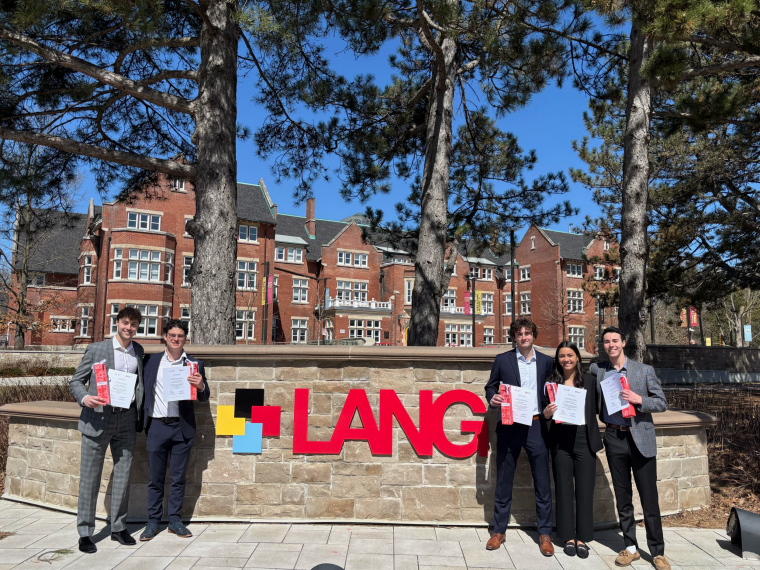Lang Wins International Olympic Committee

Lang students win International Olympic Committee Case Competition
You might say that students at the Gordon S. Lang School of Business and Economics are on a bit of a winning streak when it comes to sport-focused case competitions.
In March, Lang’s team won the International Olympic Committee (IOC) Case Study Competition for Undergraduate students, held under the academic lead of the European University of Madrid.
That’s pretty impressive, and even more so when you consider that Lang also placed first in the NHL’s new Industry Growth Fund Hockey Innovation Competition. You can read more about that victory here.
From hockey to handball
The competitions started in professor Katie Lebel’s new “sports fandom” course in the Lang School’s Bachelor of Commerce Sport and Event Management major. Invited to participate in the Olympics case competition, the NHL came on Lebel’s radar a week before the term started. Which would they prefer, Lebel asked on day one. To which these ambitious students replied “both.” So the NHL pitch became the first assignment, and the IOC case was the final project in the course.
Each competition started in class in teams of five and resulted in a top team selected. In its fourth year, the IOC Competition involved 375 undergraduate and master’s students from almost 30 universities across the globe. For the IOC competition, Lang’s winning team competed against 20 teams within their class, then 16 teams from other universities in the online semi-final round, which they won against two teams from Amsterdam and a team from the US. Not surprising that scheduling was tricky with so many time zones. In the March final, Lang’s team competed against teams from Universidad Europea de Madrid (Spain), University of Dayton (USA), and Lithuanian Sports University (Lithuania).
Bringing a European game to North America
This year’s IOC Case Study Competition focused on the question of “Growing an Olympic sport towards new participants and audiences,” with a budget of $300,000. Lang’s winning team included members Joseph Terenzio - 4th Year Sport Management Student, Spencer Leue - 3rd Year Sport Management Student, Matej Krapez - 4th Year Sport Management Student, Melanie Nicholson - 4th Year Sport Management Student, Christian Silvestri - 3rd Year Sport Management Student. The group chose to promote the sport of handball through a campaign called Handball Go, mapping out a four-year project to reinvent the sport for the North American market with the help of influencer partnerships. Student winners were awarded limited edition Olympic Swatch watches from the Paris Olympics.
Joseph Terenzio, who is also co-president of the Guelph Sports Management Association, says the competitions were a highlight of his academic career. “What started as a classroom challenge in our Sport Fandom course at the University of Guelph turned into something far bigger than we ever imagined. Competing in the IOC International Case Study Competition and going up against teams from around the world was both humbling and inspiring. This experience pushed our team to think critically, creatively, and strategically about the future of international sport participation.”
Gaining a global perspective in sport
With the NHL competition already under their belt, Lebel says that the students’ work on the IOC competition was even more refined. “Their growth across the semester was really fun to watch. Just having that ability to be empathetic with different fans, and the global twist of the IOC project forced them to think outside of the box,” she says, noting that students were given options to promote a handful of sports that had different popularity levels in different parts of the world.
Choosing handball meant that the winning team really had to grapple with why a sport so popular in Europe was not played in North America. “So the question became, why doesn't anybody play handball in North America, and what are the barriers? And how can we change the narrative around the sport and help it grow? They really had to dig in and do their research, which was a little bit different from the NHL context, as they were more familiar with the sport.”
For both Lebel and her students, the opportunity to put classroom skills to such real-world use brought the learning to the next level. "Watching my students win the IOC International Case Study Competition was one of the proudest moments of my career. Their ability to blend creativity with strategic thinking, while addressing real-world challenges in sport, exemplifies the kind of future leadership our industry needs,” says Lebel.
Terenzio agrees that the moment of competition was especially gratifying as an opportunity to represent his school and country. “To see our ideas recognized on a global stage was incredibly rewarding. We’re proud to have represented Lang and Canada, and grateful to the IOC for this unforgettable opportunity.”